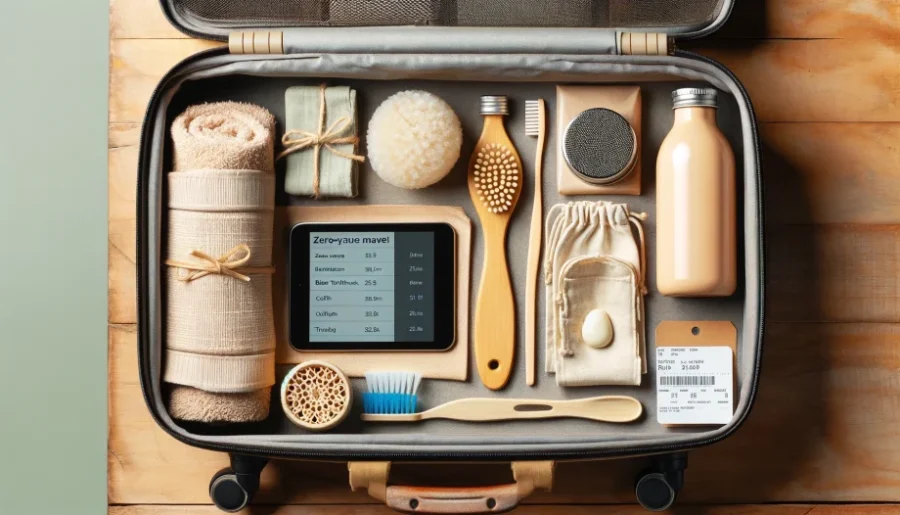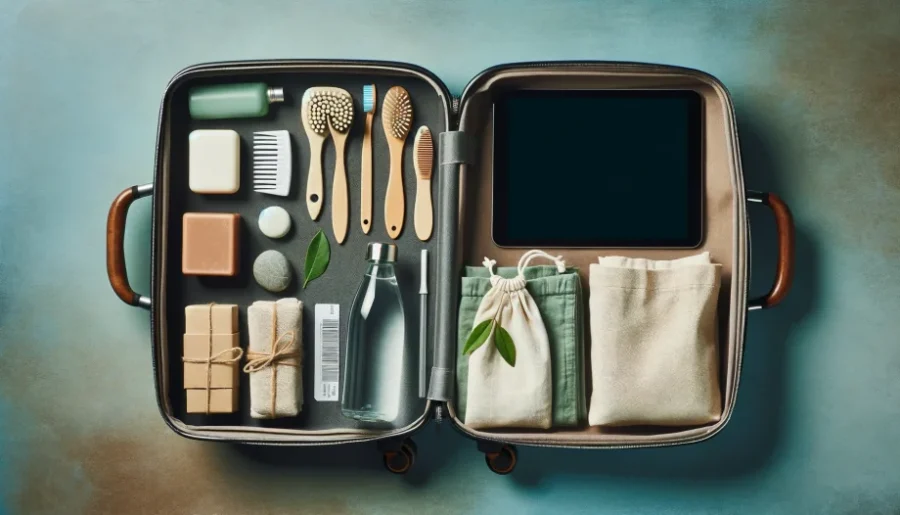
Explore Zero-Waste Packing and Travel Tips for sustainable journeys. Learn to pack light with eco-friendly products and reduce your environmental footprint.
Key Takeaways:
Zero-waste packing and travel tips include:
-
- Packing light
- Using reusable items like water bottles and cutlery
- Opting for digital tickets
- Selecting eco-friendly toiletries.
- These practices reduce waste and environmental impact, making travel more sustainable.
Embarking on an adventure with Zero-Waste Packing and Travel Tips can transform your journey into an eco-friendly experience.
These tips guide you in packing light, selecting reusable items, and minimizing waste, allowing you to explore the world responsibly and sustainably.
Join us as we delve into the world of mindful travel!
Embracing Sustainable Travel With 8 Zero-Waste Packing and Travel Tips
Traveling is one of life’s great pleasures, offering us the chance to explore new cultures, landscapes, and experiences.
However, it also has a significant environmental impact, from carbon emissions to waste generation.
Embracing zero-waste travel is a crucial step toward sustainable tourism.
It involves planning and making conscious choices to minimize our environmental footprint while exploring the world.
The Importance of Zero-Waste Travel

Zero-waste travel focuses on reducing waste to the absolute minimum, ideally aiming for no waste at all.
This approach is vital in combating the growing problem of waste, particularly plastic pollution, which has devastating effects on wildlife, ecosystems, and human health.
By adopting zero-waste practices, travelers can contribute to the preservation of natural habitats and the overall health of our planet.
Making a Difference with Zero-Waste Practices
Zero-waste practices can make a significant difference in reducing the environmental impact of travel.
Simple actions like using a reusable water bottle, packing light, and choosing digital tickets over paper ones can help reduce waste and carbon emissions.
By making these conscious choices, travelers can enjoy their adventures more sustainably and set a positive example for others to follow.
In conclusion, embracing zero-waste travel is not only about minimizing waste but also about fostering a deeper respect for the environment and the places we visit.
As travelers, we have the power to make a positive impact, one trip at a time. Here are 8 zero-waste travel tips:
1. Travel Light
Embarking on a journey with minimal baggage not only simplifies your travel experience but also has a positive impact on the environment.
Lighter luggage means reduced energy consumption during transport, resulting in lower carbon emissions.
Let’s explore the benefits of packing light and some practical tips to help you travel sustainably.
Benefits of Packing Light for the Environment:
Packing light has several environmental benefits.
It reduces the weight of your luggage, which in turn lowers fuel consumption and carbon emissions during transportation.
Whether you’re flying, driving, or taking public transport, lighter loads mean less energy is required to move you and your belongings.
This helps to minimize your carbon footprint and contribute to a more sustainable travel industry.
Tips for Packing Only What You Need:
- Make a List: Before you start packing, make a list of essential items you’ll need for your trip. This helps you stay organized and avoid packing unnecessary items.
- Choose Versatile Clothing: Opt for clothing that can be mixed and matched to create different outfits. Selecting items that can be worn in multiple ways reduces the number of clothes you need to pack.
- Limit Toiletries: Bring only the toiletries you know you’ll use. Consider using solid shampoo bars, soap bars, and toothpaste tablets to save space and reduce plastic waste.
- Use Packing Cubes: Packing cubes help you organize your luggage and compress your clothes, allowing you to fit more into a smaller space.
- Embrace Digital: Opt for digital versions of books, maps, and tickets to save space and reduce paper waste.
- Reassess Before Departure: Before you leave, take another look at your packed items. If there’s anything you can leave behind, remove it from your luggage.
By traveling light, you not only ease your journey but also play a part in protecting the environment. Every small effort counts towards a more sustainable future.
2. Choose Multi-Purpose Items
When packing for a trip, selecting items that serve multiple purposes can significantly reduce the amount of luggage you need to carry.
This not only makes your travel more convenient but also minimizes your environmental impact by reducing the weight and volume of your belongings.
Advantages of Packing Multi-Purpose Items:
- Space Saving: Multi-purpose items take up less space in your luggage, allowing you to pack more efficiently.
- Weight Reduction: Carrying fewer items means lighter luggage, which can result in lower carbon emissions during transportation.
- Cost-Effective: Investing in versatile items can save you money in the long run, as you won’t need to purchase separate items for different uses.
- Simplicity: Having fewer items to keep track of can simplify your travel experience and reduce stress.
Examples of Versatile Travel Items:
- Scarf/Blanket: A large scarf can double as a blanket on chilly flights or be used as a wrap or sarong at your destination.
- Spork: A combination of a spoon and fork, a spork is a handy tool for eating various types of meals without needing separate utensils.
- Multi-Tool: A compact multi-tool can include scissors, a knife, tweezers, and other useful gadgets in one small package.
- Foldable Water Bottle: A collapsible water bottle saves space when empty and can be refilled as needed, reducing the need for single-use plastic bottles.
- Convertible Clothing: Items like zip-off pants that convert into shorts or jackets with detachable sleeves offer flexibility for changing weather conditions.
By choosing multi-purpose items for your travels, you can enjoy a more streamlined and eco-friendly journey.
These versatile products not only serve practical purposes but also align with the principles of sustainable travel.
3. Opt for Reusable and Eco-Friendly Products
Incorporating reusable and eco-friendly products into your travel routine is a crucial step towards sustainable tourism.
By choosing items that can be used multiple times, you can significantly reduce your reliance on single-use plastics and disposable products, which are major contributors to environmental pollution.
The Importance of Using Reusable Items:
- Reduces Waste: Reusable items minimize the amount of waste generated during travel, which helps protect natural landscapes and marine environments from pollution.
- Conserves Resources: Manufacturing single-use products requires significant amounts of water, energy, and raw materials. By using reusable alternatives, you contribute to the conservation of these resources.
- Promotes Sustainable Practices: Opting for eco-friendly products encourages businesses to adopt more sustainable manufacturing processes and contributes to a greener economy.
Alternatives to Single-Use Plastics and Disposable Products:
- Water Bottles: Swap single-use plastic water bottles for a durable, reusable water bottle. Stainless steel or glass options are great alternatives that can keep your drinks hot or cold for longer periods.
- Cutlery and Straws: Bring your own set of reusable cutlery and a metal or bamboo straw instead of using disposable ones provided at restaurants and cafes.
- Shopping Bags: Pack a foldable, reusable shopping bag for groceries or souvenirs. This simple switch can significantly reduce plastic bag consumption.
- Toiletry Containers: Use refillable containers for shampoo, conditioner, and other toiletries instead of buying travel-sized plastic bottles.
- Coffee Cups: If you’re a coffee lover, carrying a reusable coffee cup can prevent the use of countless disposable cups over time.
By opting for reusable and eco-friendly products, you can make a positive impact on the environment while enjoying your travels.
These simple changes in your packing list can contribute to a cleaner, healthier planet for future generations.
4. Prioritize Sustainable Clothing
When packing for your travels, choosing sustainable clothing can significantly reduce your environmental impact.
Opting for versatile, neutral-colored garments and smart layering techniques can help you travel lighter and more sustainably.
Packing Clothes in Neutral Colors for Versatility:
- Mix and Match: Neutral colors like black, white, gray, and beige can easily be mixed and matched to create multiple outfits with fewer pieces.
- Timeless Style: Neutral-colored clothing tends to have a timeless appeal, reducing the need for frequent replacements and contributing to a more sustainable wardrobe.
The Benefits of Layering and Wearing Bulky Items During Travel:
- Adaptability: Layering allows you to adapt to varying temperatures and weather conditions without needing to pack extra clothing.
- Space Saving: Wearing your bulkiest items, such as jackets and boots, during transit can free up space in your luggage for other essentials.
- Reduced Weight: By wearing heavier items, you can lighten the load of your luggage, resulting in lower fuel consumption during transportation.
Incorporating sustainable clothing practices into your travel routine not only benefits the environment but also offers practical advantages for a more comfortable and enjoyable journey.
5. Menstrual Products and Toiletries
Choosing eco-friendly options for menstrual products and toiletries is an important aspect of zero-waste travel.
By opting for reusable and sustainable alternatives, you can significantly reduce your environmental impact while maintaining personal hygiene and comfort.
Eco-Friendly Menstrual Products:
- Menstrual Cups: Reusable menstrual cups are a great alternative to disposable tampons and pads. They are made of medical-grade silicone, rubber, or latex and can last for several years with proper care.
- Cloth Pads: Washable cloth pads are another sustainable option for menstrual care. They come in various sizes and absorbencies and can be used multiple times.
- Period Panties: These are underwear designed with built-in absorbent layers to manage menstrual flow. They are reusable and can replace disposable products for lighter days or as backup protection.
Sustainable Toiletries:
- Bamboo Toothbrushes: Swap your plastic toothbrush for one made of bamboo. Bamboo is a fast-growing, biodegradable material that makes for an eco-friendly alternative.
- Solid Toiletries: Consider using solid shampoo bars, conditioner bars, and soap bars instead of liquid products in plastic bottles. They are lightweight, last longer, and reduce plastic waste.
- Refillable Containers: For liquid toiletries that you can’t replace with solid options, use refillable containers. You can fill them with your favorite products from home and avoid buying travel-sized plastic bottles.
By incorporating these eco-friendly menstrual products and toiletries into your travel routine, you can maintain your personal hygiene practices without compromising the environment.
6. Digital Tickets and Documents
In today’s digital age, reducing paper waste has become increasingly accessible, especially when it comes to travel.
Opting for digital tickets and boarding passes is a simple yet effective way to minimize your environmental impact while traveling.
Benefits of Digital Tickets and Documents:
- Convenience: Digital tickets and boarding passes can be easily accessed on your smartphone, eliminating the need to print and carry physical copies.
- Security: Digital documents are less likely to be lost or stolen compared to physical copies. Plus, they can be quickly reissued if needed.
- Eco-Friendly: By going digital, you significantly reduce paper consumption and waste, contributing to a more sustainable travel experience.
Tips for Using Digital Tickets and Documents:
- Download Airline and Travel Apps: Many airlines and travel companies offer apps where you can store and access your digital tickets, boarding passes, and reservation confirmations.
- Use Mobile Wallets: Apps like Apple Wallet or Google Pay allow you to store boarding passes, event tickets, and other important documents in one convenient place.
- Keep Digital Copies of Important Documents: Scan or take photos of essential travel documents, such as your passport, visa, and travel insurance, and store them securely on your phone or a cloud service. This can be a lifesaver in case of loss or theft.
- Opt for Paperless Billing: Many hotels, car rental services, and tour operators offer the option to receive receipts and invoices electronically. Opting for paperless billing helps further reduce paper waste.
Embracing digital tickets and documents not only simplifies your travel experience but also aligns with zero-waste principles, making your journey more sustainable and eco-friendly.
7. Entertainment and Snacks
Entertainment and snacks are essential components of any travel experience.
By opting for digital entertainment and packing your own snacks in reusable containers, you can enjoy your journey while minimizing waste.
Going Paperless with Digital Entertainment:
- E-Books and Digital Magazines: Instead of packing physical books and magazines, download digital versions to your e-reader, tablet, or smartphone. This not only saves space in your luggage but also reduces paper consumption.
- Streaming Services: Use streaming platforms for music, movies, and podcasts. This eliminates the need for CDs, DVDs, or other physical media.
- Travel Apps and Games: Download travel apps and games to keep you entertained during long flights or waits. Many apps also offer offline modes, so you don’t need an internet connection to enjoy them.
Packing Homemade Snacks in Reusable Containers:
- Prepare Snacks at Home: Before your trip, prepare homemade snacks like sandwiches, fruits, nuts, or energy bars. This allows you to control the ingredients and avoid processed foods.
- Use Reusable Containers: Pack your snacks in reusable containers, such as stainless steel boxes or silicone bags. This reduces the need for single-use plastic wrappers and bags.
- Bring a Reusable Water Bottle: Instead of buying bottled water, bring a refillable water bottle. Many airports and public spaces now have water refill stations, making it easy to stay hydrated without generating plastic waste.
By embracing digital entertainment and packing your own snacks, you can enjoy a more sustainable and waste-free travel experience.
Going Paperless with Digital Entertainment:
- E-Books and Digital Magazines: Instead of packing physical books and magazines, download digital versions to your e-reader, tablet, or smartphone. This not only saves space in your luggage but also reduces paper consumption.
- Streaming Services: Use streaming platforms for music, movies, and podcasts. This eliminates the need for CDs, DVDs, or other physical media.
- Travel Apps and Games: Download travel apps and games to keep you entertained during long flights or waits. Many apps also offer offline modes, so you don’t need an internet connection to enjoy them.
Packing Homemade Snacks in Reusable Containers:
- Prepare Snacks at Home: Before your trip, prepare homemade snacks like sandwiches, fruits, nuts, or energy bars. This allows you to control the ingredients and avoid processed foods.
- Use Reusable Containers: Pack your snacks in reusable containers, such as stainless steel boxes or silicone bags. This reduces the need for single-use plastic wrappers and bags.
- Bring a Reusable Water Bottle: Instead of buying bottled water, bring a refillable water bottle. Many airports and public spaces now have water refill stations, making it easy to stay hydrated without generating plastic waste.
By embracing digital entertainment and packing your own snacks, you can enjoy a more sustainable and waste-free travel experience.
8. Waste Management on the Go
Effective waste management is crucial while traveling to ensure that we leave a minimal environmental footprint.
By being mindful of how we dispose of our waste, we can contribute to the preservation of the beautiful destinations we visit.
Proper Disposal of Waste While Traveling:
- Carry a Trash Bag: Keep a small reusable bag with you to collect your trash until you can dispose of it properly.
- Follow Local Guidelines: Different places have different rules for waste disposal. Always follow local guidelines and use designated bins for trash, recycling, and organic waste.
- Minimize Single-Use Items: Reduce your waste by avoiding single-use items like plastic utensils, straws, and packaging. Opt for reusable alternatives instead.
Seeking Out Recycling and Composting Options at Your Destination:
- Research in Advance: Before your trip, research the recycling and composting facilities available at your destination. Many cities and tourist areas have public recycling bins or drop-off centers.
- Ask Locals: Don’t hesitate to ask locals or your accommodation hosts about the best practices for waste disposal in the area.
- Compost Organic Waste: If composting facilities are available, make sure to separate your organic waste, such as food scraps, for composting. This helps reduce landfill waste and contributes to soil enrichment.
By practicing responsible waste management on the go and seeking out recycling and composting options, we can enjoy our travels while protecting the environment for future generations.
FAQ Section: Navigating Zero Waste Travel
Embarking on a zero-waste journey while traveling can raise many questions.
In this FAQ section, we address some common queries to help you navigate your way through a more sustainable and waste-free travel experience.
Q: How can I reduce waste when flying?
A: To reduce waste while flying, consider bringing your own snacks in reusable containers, using a silicone zip lock bag for liquids, and refusing single-use items provided by the airline.
Opt for airlines that are making efforts to reduce waste and recycle any trash you have.
Q: What are some zero waste toiletry options for travel?
A: For zero-waste toiletries, consider using eco-friendly products such as solid shampoo bars, bamboo toothbrushes, and reusable razors.
Look for products with compostable packaging or those that can be refilled.
Q: How can I manage laundry while traveling with minimal waste?
A: For laundry, consider packing a minimalist wardrobe to reduce the need for frequent washing. Use laundry detergent sheets, pods, or soap nuts for a low-waste solution. You can also spot wash clothes with a zero-waste laundry detergent bar.
Q: What are some tips for zero-waste dining and shopping while traveling?
A: When dining and shopping, bring your own reusable containers, cutlery, and shopping bags.
Opt for local farmers’ markets and bulk stores to avoid packaging waste.
Use apps like Too Good To Go, Zero Waste Home, and ShareWaste to find package-free options.
Q: How can I participate in zero-waste travel tours?
A: Choose tour companies with a sustainable focus that provide food in reusable containers and offer filtered water for refilling your bottle. Consider renting gear instead of buying new equipment.
By addressing these questions and adopting zero-waste practices, you can make a positive impact on the environment while enjoying your travels.
Conclusion: Making a Positive Impact
As we conclude this guide on zero-waste travel, it’s clear that adopting sustainable practices can make a significant difference in reducing our environmental footprint.
Each individual action, no matter how small, contributes to a larger collective impact that can lead to a more sustainable and eco-friendly world.
Encouraging Travelers to Adopt Zero-Waste Practices:
We encourage all travelers to embrace zero-waste principles in their journeys.
By making conscious choices, such as using reusable items, opting for digital documents, and minimizing waste, we can travel more responsibly and preserve the beauty of our planet for future generations.
The Collective Impact of Individual Actions:
The power of collective action cannot be understated.
When each traveler commits to reducing their waste, the cumulative effect can lead to significant environmental benefits, including reduced pollution, conservation of natural resources, and a decrease in greenhouse gas emissions.
Together, we can make a positive impact and ensure that the world remains a beautiful and vibrant place to explore.
In summary, zero-waste travel is not only about minimizing waste but also about fostering a deeper respect for the environment and the destinations we visit.
By adopting sustainable practices, we can enjoy our travels while contributing to a healthier planet.
Read more: Mastering Zero-Waste Living: 7 Easy Tips and Tricks
Resources: Enhancing Your Zero-Waste Travel Journey
To further support your zero-waste travel endeavors, here are some authoritative resources that provide valuable information, tips, and guidance:
- U.S. Environmental Protection Agency (EPA): The EPA offers insights and resources on zero waste, including strategies for reducing waste and the environmental benefits of waste reduction. Visit the EPA’s Zero Waste page.
- Zero Waste International Alliance (ZWIA): ZWIA provides a global perspective on zero waste, offering principles, standards, and case studies to help individuals and communities achieve zero waste goals. Explore ZWIA’s resources.
- World Footprints: World Footprints offers a thoughtful exploration of zero-waste travel and its potential for positive impact, along with tips for reducing waste while traveling. Read about Zero-Waste Travel on World Footprints.
- Ecotero’s Zero Waste Travel Tips
- Jill on Journey’s guide to Zero Waste Travel.
By exploring these resources, you can deepen your understanding of zero-waste travel and discover new ways to make your adventures more sustainable and environmentally friendly.











